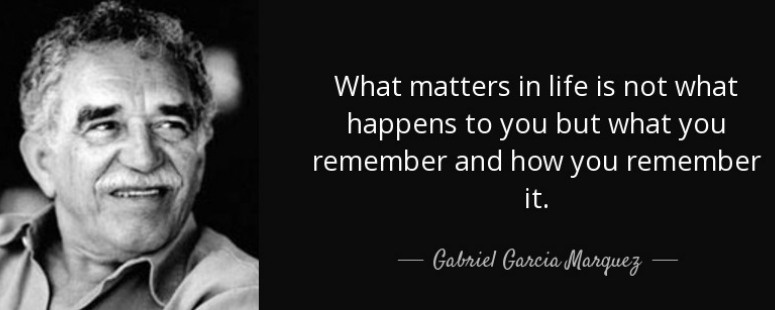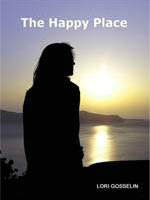How do You Remember?

It’s cold here on the porch, but I’m going to dust the snow off the chairs, wrap myself in a blanket and sit with my coffee. It’s nice to see you again! My courses have kept me so busy that I didn’t feel I had time to blog, which is ironic because I’m learning so much that we could talk about. But for now, I just wanted to share something I’ve been thinking about.
I heard the quote by Marquez and it struck a chord with me. You know how that happens – in an ocean of words you hear during a day, a few keep washing up on the shore of your awareness, trying to get your attention. Memory is an interesting topic because our memory doesn’t function in the way most people believe it does.
For instance, did you (too) think of your brain as a sort of a filing cabinet, storing away file after file of the data of our life experiences? After something painful happens, like the loss of a loved one, it seems we need to review every single memory, file after file of data, until the pain has become dull over time. But the brain doesn’t store memories that way. This article explains how this is not so, and a whole lot more about memory, that memory is not solid at all. When we remember something, we are not actually recalling the original memory, but instead, we are remembering the memory as it was the last time we visited it. The word “re-member” describes the process perfectly.
If we put a different frame around an incident, we effectively decide exactly how we want to remember it. Wayne Dyer’s said, “If you change the way you look at things, the things you look at change.” Who knew this could also be applied to our memories.
The brain is constantly changing. We can become active participants in this change by consciously reframing the painful stories of our lives. We can’t bring a loved one back, but we can frame the time we had with them with golden yellow rather than gloomy grey. We can shine a light on the happiest memories in the frame, perhaps even cut out the happy parts and create a collage with them. Reframing alone will elicit a different emotional response when we recall the memory later.
We have the power to change our stories because our stories exist only in our memories. In reframing our memories we redefine ourselves and determine the quality of our lives.
What do you think?

 Welcome to Life, for instance!
Welcome to Life, for instance! “Lori shares plenty of feet-on-the-ground advice and techniques for forming and fostering community... The newcomer to community building will get a solid foundation, and the experienced community builder will find a useful framework as well as some new tools for the toolbox.”
“Lori shares plenty of feet-on-the-ground advice and techniques for forming and fostering community... The newcomer to community building will get a solid foundation, and the experienced community builder will find a useful framework as well as some new tools for the toolbox.” "Lori has put together a real
page turner of a book. With
great humility Lori has woven
together a very insightful
personal story of transformation...
and in the process has put
together a doable set of steps
that anyone can do and
follow to their own happy place."
"Lori has put together a real
page turner of a book. With
great humility Lori has woven
together a very insightful
personal story of transformation...
and in the process has put
together a doable set of steps
that anyone can do and
follow to their own happy place."






